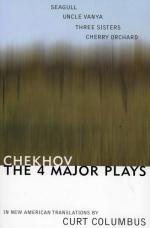|
This section contains 333 words (approx. 1 page at 400 words per page) |

|
Uncle Vanya Summary & Study Guide Description
Uncle Vanya Summary & Study Guide includes comprehensive information and analysis to help you understand the book. This study guide contains the following sections:
This detailed literature summary also contains Bibliography and a Free Quiz on Uncle Vanya by Anton Chekhov.
Uncle Vanya, Anton Chekhov's masterpiece of frustrated longing and wasted lives, was originally a much more conventional drama in its earlier incarnation. Previously known as The Wood Demon, the play was rejected by two theaters before premiering in Moscow in December of 1889 to a very poor reception (it closed after three performances). Sometime between that date and 1896, Chekhov revised the play, altering it radically. Although the work that emerged is more static than the originalin terms of narrative events, far less happensit is considered one of the most poignant evocations of thwarted desire ever written. Vanya is literally haunted by the man he might have been: "Day and night like a fiend at my throat is the thought that my life is hopelessly lost."
Uncle Vanya was scheduled to premiere at the Maly Theater in Moscow, but the Theatrical and Literary Committee overseeing it and other imperial theaters asked Chekhov to make substantial revisions to the play. Instead of making the suggested changes, he withdrew the play and submitted it to the Moscow Art Theater, where Uncle Vanya was first performed on October 26, 1899, under the direction Konstantin Stanislavsky. It was well received.
With Uncle Vanya and Chekhov's three other dramatic masterpiecesThe Sea Gull, The Three Sisters, and The Cherry OrchardChekhov demonstrated that a production could be riveting with out conforming to traditional notions of drama. In Critical Essays on Anton Chekhov, Russian author Vladimir Nabokov (Lolita) noted that Chekhov's plays are not overtly political or freighted with a social message: "What mattered was that this typical Chekhovian hero was the unfortunate bearer of a vague but beautiful human truth, a burden which he could neither get rid of nor carry." Today, Chekhov stakes a double claim in the world of literature: he is equally acclaimed as a master of the short story and of the dramatic form. Uncle Vanya is widely considered to be his greatest achievement in the latter genre and a masterpiece of modern drama.
Read more from the Study Guide
|
This section contains 333 words (approx. 1 page at 400 words per page) |

|



